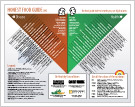
(Natural News) A National Health Interview Survey found that 82 percent of American adults between the ages of 65 and 74 rated their health as either “excellent,” “very good” or “good” despite the fact that around 60 percent of older Americans are managing two or more chronic conditions.
The National Health Interview Survey was administered by the Centers for Disease Control and Prevention. According to their data, only 18 percent of participants described their health as either “fair” or “poor.” However, this totally contradicts data from the Office of Disease Prevention and Health Promotion, which states that roughly 60 percent of adults over the age of 65 are battling at least two chronic conditions such as high blood pressure, heart disease, bronchitis or emphysema, diabetes, Alzheimer’s disease and cancer.
Older adults may be thinking differently about their health
The disparity lies in what older adults perceive as “good health.” For many people, this means not being burdened by either an illness or a disability. However, for seniors, poor physical function is less important. The factors they consider more important are vitality, healthy emotional well-being, having positive social relationships, remaining active and being generally satisfied with life.
Lorelei Goldman, 80, of Evanston, Ill. said: “Being healthy means being able to continue doing what I like: going to the theater, organizing programs, enjoying the arts, walking.” She has described her health as “good” despite having gone through ovarian and breast cancer.
Sponsored: NEW Biostructured Silver First Aid Gel created by the Health Ranger combines three types of silver (ionic silver, colloidal silver, biostructured silver) with seven potent botanicals (rosemary, oregano, cinnamon and more) to create a breakthrough first aid silver gel. Over 50 ppm silver, verified via ICP-MS lab analysis. Made from 100% Texas rain water and 70% solar power. Zero chemical preservatives, fragrances or emulsifiers. See full details here.
“I have all my faculties and good, longtime friendships,” continued Goldman. She said that she is sleeping well and that she is involved in a lot of activities that make her feel “sustained” and bring her both clarity and joy.
Goldman’s metrics for what constitutes “good health” are different from that of younger adults, who may measure their ideal health as closer to the norm of “there shouldn’t be anything wrong with me.” These standards seem to change as people get older.
Self-perception is more than just wishful thinking
Many researchers have noted that self-rated health can be a good predictor of longevity, even if many of those who claim to be in good health are dealing with one or more chronic conditions. Good cognitive health and use and access to healthcare services are also good factors for long life. (Related: Unlocking longevity: What do people who live to 100 have in common?)
Ellen Idler of Emory University and Yael Benyamini of Tel Aviv University were one of the first researchers to highlight the association between self-rated health and mortality in their article published in 1997 in the Journal of Health and Social Behavior.
In an interview, Benyamini offered two possible explanations for the disparity between actual health and self-rated health.
Firstly, Benyamini suggested that a person’s body may be able to tolerate more than what doctors may recommend. A person with diabetes, angina and osteoarthritis may get used to these conditions and find a way to live with them without them greatly affecting their quality of life.
Secondly, people who feel healthy, even if they carry an illness or condition, may be more likely to be physically active and take care of themselves better. This means that simply “feeling healthy” may be enough to help people survive.
There are still some dark spots when it comes to self-rated health. For example, African Americans, Asian Americans and Hispanic Americans with lower levels of either income or education are less likely to rate their health positively as they age. Younger women may also perceive their health more negatively than men of a similar age, and a person’s mental health also factors in heavily to self-rated health.
Sources include:
















